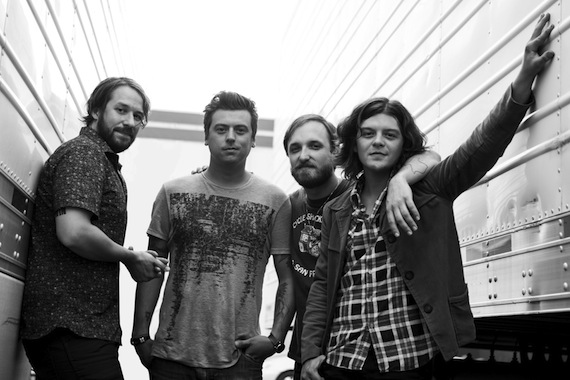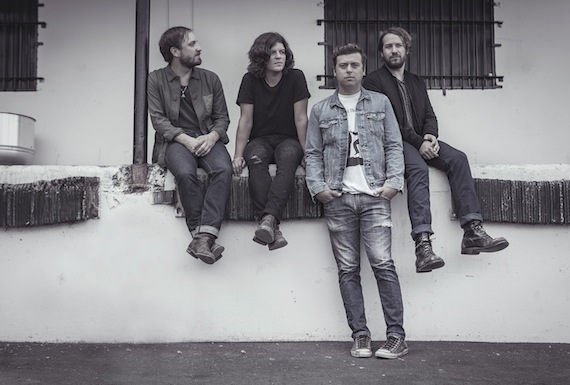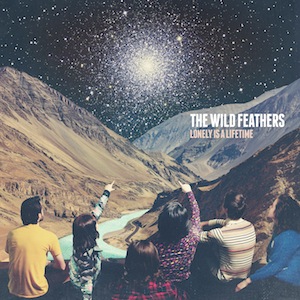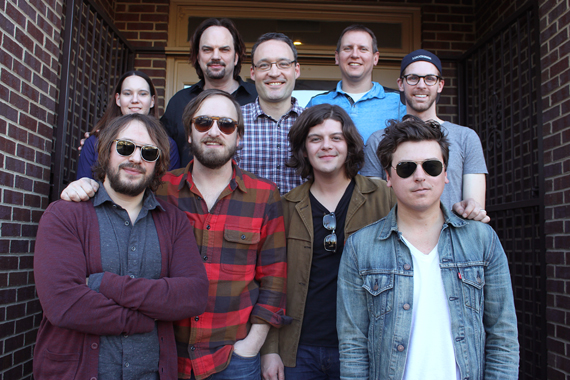

The Wild Feathers
With a band name like The Wild Feathers, following your animal instinct comes naturally. The Nashville-based band has scaled back its Americana leanings for their second full-length release, Lonely Is a Lifetime, released Friday (March 11) through the L.A. division of Warner Bros. Records. Although it’s more experimental, it also offers the tight musicianship that comes from playing hundreds of shows promoting their 2013 self-titled debut album. The band will no doubt offer up tracks from the project during their recently announced show at Nashville’s Ryman Auditorium, slated for Saturday, June 25.
Band members Ricky Young, Joel King, Ben Dumas, and Taylor Burns dropped by MusicRow offices after a photo shoot earlier this month to talk about the project. Even after a few years on the road, they’re all still friends, which lends itself to a loose, easy conversation.
MusicRow: Tell me about the vibe in the studio when you were making this record.
Young: It was pretty inspiring because we worked with Jay Joyce again. While we were making the first record, he was in the process of buying this big church in East Nashville. We were thinking, “Man, I really hope we get to record in that someday.” And a couple of years later, we did. It was a super awesome and he’s an incredible guy.
Dumas: He would play along with us. A lot of times, producers will get in there and listen way too closely, almost to a fault. He wouldn’t do that. We would all just play and whenever if felt we had something that felt good, and everybody had fun playing it, he’d say, “Yeah, I think we got it. Let’s go listen to it.”
MR: One thing you guys can’t fake in your band is the chemistry. I can really hear it on “Goodbye Song,” when you jam at the end. Why do you think you click so well?
Young: I think we genuinely appreciate where we’re all coming from musically, and as people. We’re not those immature, ego/argument types. [In disagreements] we’ll say, “That’s a really good point.” You don’t really try to argue for the sake of being heard. It’s what benefits the song or the album, or what does the most good for the overall situation.
Burns: And we spent four years non-stop in a van, right on top of each other, so it was either like kill each other or figure it out. And it happened easily, is what I’m saying. We’re friends with a lot of other bands and there are horror stories out there of people hating each other. But luckily we don’t hate each other yet.
MR: At what point did songwriting become something you knew you’d like to do?
Burns: I always wrote songs because first off, I wasn’t good enough to learn other people’s songs. I was like, “That’s too hard to learn that song. I’m just going to make one up.” So, that was it for me. You suck for a long time, then you get a little better, and a little better, and then people say, “Maybe you should be a songwriter.”
Young: That’s exactly how it happened for me. I remember trying to figure out songs from that early grunge era and thinking, “Man, I know this is pretty easy but I just cannot do it.” You know, I was 12 or 13 years old. So I wrote my first song, and thought I’d made up the chords, because I had no idea what a G was. It happened to work out perfectly. Like, a G, an E minor 7, and a D. I wrote like 11 verses to that one progression, like, “Dude, I can do this!”
King: I learned how to play, and played covers, and then thought, “OK, now I know how to play. I have to find a guy that can play drums or whatever.” And you’d start forming bands. “OK, what do bands do? I guess they have to write songs.” The same way you go from wearing the band’s T-shirt to dressing like the band. I was like, “You know what? I don’t want to be a fan, I want to be like them. I want that to be me on stage, singing songs I wrote.”

The Wild Feathers: Taylor Burns, Joel King, Ricky Young, and Ben Dumas. Photo: Frank Maddocks
MR: When this record hits, it could introduce another side of Nashville to people around the country. Why was it important for you to stay in Nashville and be a Nashville band?
King: It’s just easier being here I guess. (all laugh)
Young: It’s inspiring. You can be sitting around doing anything, and somebody else is getting better and writing a better song. We all come from different towns where there’s not a whole lot of that going on, and you think you’re pretty good. Then you move here and think, “Man, that waiter is way better than me.”
Burns: It is the competitive factor, and it pushes you to be better. You’re surrounded by like-minded people in the musician community. The musicianship here is off the charts. Coming from Austin, which is the Live Music Capital of the World, I love Austin, and there are great musicians there but not nearly the high concentration that there are here. There are more studios here. There’s just more work here, so all musicians flock here. We moved here for the scene because it’s an inspiring place, and this is where some of our favorite bands migrated to, but also logistically, touring out of Nashville is way easier than touring out of Texas.
King: Where I come from [in Oklahoma], anybody who makes a living playing music is probably playing in a casino for four hours straight. But really, the comforting thing is that you see other people living their lives and playing music. In high school, you say, “I want to be a musician,” and they say, “Well, you need to have a backup plan.” In Nashville, it’s like, “Cool, get busy.” It’s more feasible. Look, I didn’t know people had long careers and had kids. ‘Musician’ is not a legitimate job in Oklahoma, and I thought, ‘Well, you’ve got to go wherever your industry is.” I thought it was great to hang out and see how people do it, because I want to be in music for the rest of my life, so I’ve got to be here for that.
 MR: When you listen to the album now, what kind of impressions go through your mind?
MR: When you listen to the album now, what kind of impressions go through your mind?
Young: Pride, I think. It’s the first word that came into my mind. We worked super hard, not only writing and recording it, but touring the last record and growing into different kinds of guys and musicians on the road. That led to the songs and experiences and all that stuff. When I hear certain songs, it brings me back to a certain soundcheck, or a certain day in Cleveland where someone had an idea and we messed around with it, took a voice memo of it, and turned into something.
King: There’s a lot of people that say that a record is like a record of your life at one point. I think good bands should do that.
Burns: I think it’s an evolution from our first album. We’ve grown as men, as musicians, as bandmates, and everything else. I think you can hear it when you listen to it, or at least I can.
MR: What is it that you’re hearing that makes you think so?
Burns: It’s more experimental than the first one. It’s a different sound than the first record. Even there, I think we knew we didn’t want to make the same record twice, and we set out to do something different on purpose, to push ourselves and to prove that we could do it, and to write songs that weren’t necessarily in our wheelhouse, like they were on the first record.
Young: On the first record, we always sat around a coffee table drinking coffee or beer, with an acoustic guitar. It had that natural swing. And then this record, we had all these ideas writing with electric guitars, and as opposed to a swing, it’s more of a tempo thing.
MR: What do you hope your fans will take away from listening to this record?
Young: Hopefully the exact same thing – that we’ve evolved as musicians, and as people.
Burns: It still sounds like us, but that’s what I was nervous about originally. Like, “We’re changing it up quite a bit,” or at least it felt like we were, until I listened back to some of the first mixes. I thought, “This sounds like The Feathers, this sounds like us.” We don’t always know what that is because we’re only two records in, but we’ve established this thing and you want to be true to it, but also be true to yourself and push yourself. I just hope people appreciate the songwriting and will want to come to the show because that’s what we like to do more than anything – to play live – and I think we’re pretty good at it.

The Wild Feathers pose with MusicRow staff.



